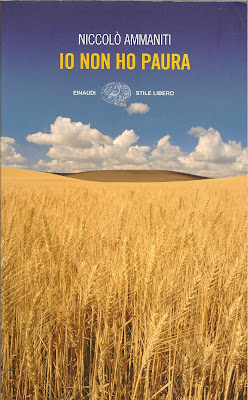

We have been reading Io non ho paura (I’m Not Scared) by Niccolò Ammaniti in our Italian class at Three Things Italian and there are several pieces of music that are used in the story that we wanted to mention here. First, some background on the story. Ammaniti published the book in 2001 and it was made into a movie released in 2003. The story takes place during Italy’s anni di piombo (years of lead) which were a period of social and political turmoil in Italy from the late 1960s to the early 1980s. The turmoil was marked, in particular, by kidnappings, including the kidnapping and assassination of Aldo Moro. With this as background, the story is set in 1978 and involves a kidnapping of the young son of a rich northern family. The kidnapped boy is kept in a hole somewhere in the south of Italy and it’s upon this hole the main character Michele Amitrano stumbles. As the story unfolds Michele finds out why the boy is in the hole and who is involved.
The musical references include:
Chapter 4. A snippet from Verdi’s La traviata. While Michele’s mother is spanking him, La traviata is playing on the radio. Italian: "Croce. Croce e delizia. Delizia al cor..." English: “Torment. Torment and delight of my heart…”
Chapter 5. The song Bello Ciao is an Italian partisan song of World War II is sung by Barbara as she approaches the carob tree where Michele is hiding. "O partigiano, portami via, che mi devon seppellir. O partigiano, portami via. O bella ciao ciao ciao". English: "Oh partisan carry me away, because they must bury me. Oh partisan, carry me away. Oh goodbye beautiful, bye, bye." Michele has taken refuge in the tree because he did not want to share his bedroom with Sergio, a visitor to his home. The song reflects Michele rebelling against authority, his parents.
Mina’s Parole, Parole, Parole where we find the not so nice Felice Natale (yes, that’s his name) singing it at the abandoned house where the kidnapped boy is hidden. Italian: "Tu sei come il vento che porta i violini e le rose. Parole, parole, parole. Ascoltami. Parole, parole, parole. Ti prego." English: “You are like the wind that brings violins and roses. Word, words, words. Listen to me. Words, words, words. I beg you.” We’ve always had a thing for Mina here at Travelmarx: Mina, Mina, Mina; Back to Mina, E Poi Mina, Bula Bula, and Carosello – Italian Ads. The use of the song here foreshadows the discovery by Michele that his parents' advice is hollow in terms of whom they say are the people in the world you have to watch out for.
Chapter 6. Lucio Battisti’s Con il nastro rosa. In this scene Michele’s mamma, Teresa Amitrano, singing to herself in one of her few worry-free moments. Italian: "Inseguendo una libellula in un prato, un giorno che avevo rotto col passato." English: “Chasing a dragonfly in a meadow, a day that I had broken with the past.” By the end of the story, the past will creep up on Teresa.
A nursery rhyme (filastrocca) about the cuckoo of Northern Italy that the tormented Felice sings as he catches Michele with the kidnapped boy. "L'inverno è passato, l'aprile non c'e più, e ritornato è maggio al canto del cucù, cu-cù, cu-cù, l'aprile non c'è più, e ritornato è maggio al canto del cucù." A nonliteral but phonetically better sounding translation is “The winter now is over, And April rains are gone. It’s May again, I know, For I hear the cuckoo’s song.”
Chapter 10. Paolo Conte’s Onda su onda. In this scene, Melichetti, a farmer, is singing the song late at night watched by Michele from the darkness. Italian: "Che acqua gelida qua, nessuno piú mi salverà. Son caduto dalla nave, son caduto, mentre a bordo c’era il ballo. Onda su onda…" English: “What freezing cold water here, no one will save me at all. I fell off the boat, I fell while on board there was a dance.” The song literally describes Michele's situation, out in the dark of night trying to find his way as he attempts to free the kidnapped boy. Michele was also figuratively thrown overboard from the ship that was his innocent youth.
No comments:
Post a Comment
All comments are moderated. If your comment doesn't appear right away, it was likely accepted. Check back in a day if you asked a question.